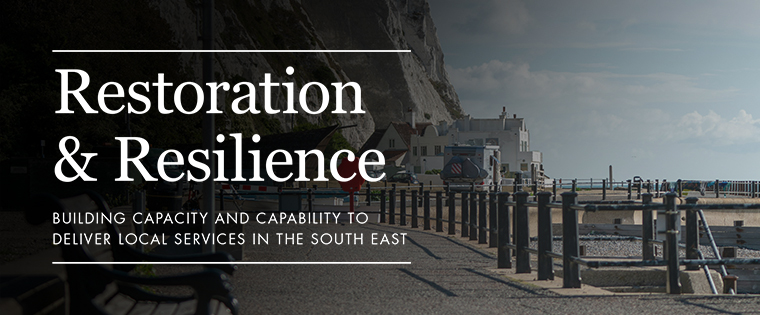Restoration and Resilience
Building capacity and capability to deliver local services in the South East
Author: Callin McLinden |

The South East of England, often perceived as a beacon of affluence and economic success, presents a paradoxical challenge to policymakers. Beneath its reputation as a prosperous and “overheated” economic hub lie stark inequalities and financial pressures that are increasingly testing the resilience of local governance. A decade of austerity has eroded the capacity of councils to deliver dependable services, with many resorting to minimum statutory provision to survive. Amid this backdrop, the need for a nuanced devolution and policy framework that addresses the South East’s diverse and complex realities has never been greater.
Restoration and resilience examines the critical challenges facing local authorities in the South East and advocates for targeted strategies that align with the region’s unique needs. By exploring approaches to capacity-building, collaborative governance, and tailored devolution, it sets out a roadmap for sustainable service delivery and regional renewal. The research underscores the importance of empowering councils with enhanced fiscal powers, data-driven decision-making capabilities, and robust partnerships to mitigate disparities and foster resilience. This work seeks to provide a foundation for informed, strategic interventions that can transform the region and its constituent local authorities into a model of sustainable and equitable governance.
Key Points
Strategic capacity building for long-term resilience
- Local authorities in the South East must embrace a transformative shift in governance by building strategic capacity that prioritises data-driven, preventative service models. Leveraging advanced analytics and AI tools to anticipate and mitigate demand surges allows councils to transition from reactive crisis management to forward-thinking service delivery. This proactive approach, combined with embedding social value into strategic commissioning, ensures that service contracts meet immediate needs while fostering broader economic, social, and environmental benefits.
- Succession planning and workforce development are equally critical, with councils utilising workforce analytics to identify skill gaps and implemented targeted initiatives that align with strategic objectives. By bolstering professional expertise in financial governance and risk management, councils can navigate complex commercial ventures while ensuring long-term sustainability. This holistic mindset will lay the foundation for enduring community resilience and service dependability.
Cross-boundary collaboration and regional cohesion
- The fragmented political and economic landscape of the South East necessitates a robust framework of multi-tier, cross-boundary partnerships. Local authorities must break down longstanding silos to develop integrated service models and cohesive regional strategies in areas like housing, social care, and transport
- Collaborative governance, supported by shared resource pools and standardised workforce initiatives, can mitigate financial pressures and address staffing shortages. Strategic alliances with third-sector organisations, educational institutions, and other councils are instrumental in driving efficiency and innovation.
- By fostering consortia to negotiate with external providers and centralising workforce training, councils can reduce reliance on temporary staff and build a resilient, permanent workforce. Integrated Care Systems and regional infrastructure plans represent vital steps towards addressing complex service needs, ensuring that collaborative governance becomes the cornerstone of regional renewal.
Devolution for economic development
- The South East’s economic vibrancy demands a bespoke devolution framework that grants local authorities greater fiscal autonomy and control over key policy areas. By leveraging powers such as localised taxation, housing and transport planning, and skills funding, councils can address regional disparities while enhancing economic resilience.
- Devolution must prioritise fiscal sustainability through innovative revenue-generation mechanisms, such as tourism taxes, reducing dependence on volatile central grants.
- A strategic focus on housing affordability, infrastructure development, and social care gaps allows the region to harness its strengths while addressing pressing challenges. This approach, combined with an openness to enhanced collaboration positions the South East as a model for regionally nuanced governance.
Recommendations
Recommendations to local government
- Local authorities in the South East should strengthen financial governance and strategic leadership.
- Local authorities in the South East should strengthen commercial practices and diversify revenues.
- South East local authorities must collaborate in managing public service contracts.
- South East local authorities must engage in comprehensive, collaborative and data-driven strategic workforce planning.
- South East local authoriites should work towards revitalising apprenticeships and training.
- Councils must begin to priorisie integrated, resilient and preventatitve service models.
- Local authorities in the South East must collaborate on infrastructure and housing delivery.
Recommendations to central government
- Central government must push on with and accelerate reform of social care funding.
- Government should expedite the review of funding formulae and reset business rates.
- The new MHCLG Workforce Development Group must be empowered to provide support measures to address the staffing crisis in local government.
- The Spending Review, the English Devolution Bill and the Planning and Infrastructure Bill must work in tandem to establish and fund mechanisms for cross-boundary spatial planning.
Research kindly sponsored by:


